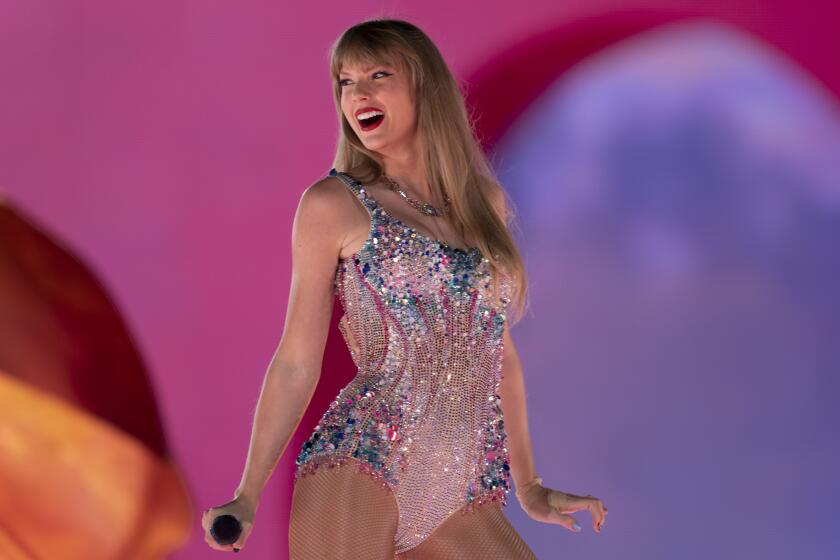U.S. to step up piracy battle
WASHINGTON -- In the battle against pirated American movies, music and other intellectual property in China, the Bush administration has tried the carrot. Now it’s turning to the stick.
That was the sign the U.S. sent Monday as it decided to launch formal complaints against Beijing with the World Trade Organization. Although the move risks escalating already tense trade relations, U.S. officials and Hollywood executives have become increasingly frustrated with the continued flood of bootleg DVDs and other products from China.
The Motion Picture Assn. of America estimates that in 2005, more than nine of every 10 DVDs sold there were illegal copies. In recent years, Chinese and U.S. officials have been working together to solve the problem, but U.S. Trade Representative Susan Schwab said Monday that 80% of all counterfeit products seized at U.S. borders still come from China.
“This is more than a handbag here or logo item there; it is often theft on a grand scale,” Schwab said at a news conference announcing the filing of WTO complaints. She punctuated her point by holding up a copy of “Night at the Museum,” the Ben Stiller comedy that won’t be released on DVD for two weeks. It was one of 500 pirated movies, music CDs, books and trademark products, such as Zippo lighters, seized in China and flown to the U.S. in the last week.
“Protection of intellectual property rights is a vital responsibility in modern commerce,” Schwab said. “All countries must take protection of these rights seriously.”
Schwab announced that the United States would file two requests today for “dispute settlement consultations” with China through the WTO. One request asserts that China has failed to adequately protect copyrights and trademarks on intellectual property; the other says China has maintained unfair trade barriers against U.S. companies trying to sell those products legally in China.
China had no immediate public response.
The formal WTO actions would be the first by the U.S. against China regarding intellectual property since Beijing joined the international trading community in 2001. The complaints come as newly empowered congressional Democrats, along with many Republicans, are railing against China’s policies and the soaring U.S. trade deficit.
Lawmakers cheered Monday’s decision even as they lamented that it was long overdue.
“Late is better than never,” said Sen. Charles E. Schumer (D-N.Y.), part of a bipartisan group complaining that China has been manipulating its currency. “China has no excuse to allow American intellectual property to be ripped off without consequences.”
Dissatisfaction with China’s lax enforcement of its anti-piracy laws has been building for years among lawmakers and business groups, but until now the Bush administration has focused on helping the Chinese government strengthen its laws and improve its enforcement.
Schwab touted one recent change: The Chinese government last week cut from 1,000 to 500 the number of pirated items, such as DVDs, a suspect must possess for authorities to bring criminal charges. But she said the threshold was still too high.
Although Chinese officials have been moving in the right direction, she added, they haven’t acted strongly or quickly enough to stem the tide of pirated movies and music or make it easier for U.S. companies to sell those products there. For example, China still allows only 20 foreign films into theaters each year.
“I think our companies said, ‘We’ve had limited progress, let’s try this,’ ” said MPAA Chief Executive Dan Glickman. An MPAA study found the major movie studios had lost $244 million to piracy in China in 2005.
The Bush administration effort is limited to certain types of intellectual property, particularly movies, music and books. Piracy has been a problem with some other products, such as computer software, but there has been more progress in addressing those issues. For example, last year Chinese computer makers agreed to install software in the factory, lessening the demand for bootleg versions.
The new WTO complaints are likely to ratchet up tensions between the U.S. and China, coming just a few weeks after the Bush administration announced that it would allow U.S. firms to seek higher tariffs in cases where Chinese products received illegal subsidies. In February, the Bush administration filed a WTO case alleging that Chinese steelmakers and other exporters benefited from a wide range of government subsidies.
In many areas of China, officials have been reluctant to clamp down on the counterfeit trade, as the manufacturing, distribution and retailing of fake DVDs and other goods provide countless jobs. And allowing more sales of legitimate products could cut into China’s own entertainment industry.
“If our government opens the market right away without restrictions, it will definitely hurt the domestic film industry,” said Hu Min, general manager of Hengdian Group’s Mandarin Film & Television Post-Production Co. “We’re still like a teenager compared with the American movie industry.”
Some legal experts believe the U.S. pressure will backfire, stoking nationalist sentiments and making it harder to push reforms, said Lyle Vander Schaaf, a Washington attorney who traveled to China with an American Bar Assn. delegation reviewing reforms of the country’s intellectual property laws.
“Many of them genuinely believed that if the U.S. meddled in their affairs, it would have the reverse effect,” he said.
However, Robert Cassidy, a former Clinton administration trade official, said simply filing a WTO case might prompt action by officials in Beijing. After the administration filed a case accusing China of discriminating against U.S. semiconductor makers, Chinese officials agreed to modify the offending tax.
David Wolf, head of Wolf Group Asia, a consultant in Beijing that specializes in the media industry, said China might use the WTO complaint as an opportunity to pressure local officials to crack down on piracy because many Chinese officials see the protection of intellectual property rights as important for nurturing domestic industries.
U.S. officials have always had to balance applying public pressure on China with behind-the-scenes bilateral negotiations, said I.M. Destler, a University of Maryland professor and author of “American Trade Politics.” It’s difficult to know how China will respond, but the Bush administration has been facing too much pressure from Congress not to act, he said.
Schwab dismissed suggestions that the two countries were entering a “trade war,” and said the WTO complaints were simply part of a maturing trade relationship with China. She said she’s hoping for a negotiated settlement before the WTO gets to a point of possibly assessing trade sanctions.
evelyn.iritani@latimes.com
*
Puzzanghera reported from Washington and Iritani from Los Angeles. Correspondent Don Lee in Shanghai contributed to this report.
*
(BEGIN TEXT OF INFOBOX)
What’s next
--
The U.S. intellectual property complaints against China with the World Trade Organization begin with a 60-day consultation period in which the two sides try to solve the dispute. If those talks fail, Washington can ask a panel to review the dispute, which takes about six months. Both sides make their case and the panel decides whether WTO rules have been broken and, if so, what measures should be taken. The ruling can be appealed. If the panel’s recommendations are upheld, China would have to comply or face trade sanctions, such as the United States raising duties on Chinese products. The entire process takes about 18 months.
*
Source: Times research
More to Read
The biggest entertainment stories
Get our big stories about Hollywood, film, television, music, arts, culture and more right in your inbox as soon as they publish.
You may occasionally receive promotional content from the Los Angeles Times.






